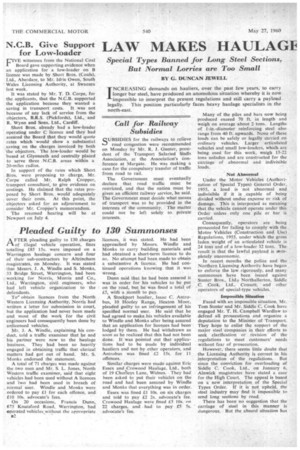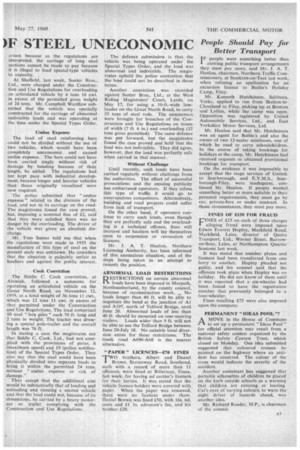LAW MAKES HAULAGI )F STEEL UNECONOMIC
Page 36

Page 37

If you've noticed an error in this article please click here to report it so we can fix it.
Special Types Banned for Long Steel Sections, But Normal Lorries are Too Small
BY G. DUNCAN JEWELL INCREASING demands on hauliers, over the past few years, to carry longer bar steel, have produced an anomolous situation whereby it is now impossible to interpret the present regulations and still carry a payload legally. This position particularly faces heavy haulage specialists in the north-east.
Many of the piles and bars now being produced exceed 70 ft. in length and weigh on average about 2 tons. Lengths of 1-in.-diameter reinforcing steel also range from 40 ft. upwards. None of these loads can be safely or legally carried on ordinary vehicles. Larger articulated vehicles and small low-loaders, which are being used for this work, weigh 15-22 tons unladen and are constructed for the carriage of abnormal and indivisible loads.
Not Abnormal Under the Motor Vehicles (Authorization of Special Types) General Order, 1955, a load is not abnormal and indivisible if it is capable of being divided without undue expense or risk of damage. This is interpreted as meaning that the vehicle cannot operate under this Order unless only one pile or bar is carried.
Consequently, operators are being prosecuted for failing to comply with the Motor Vehicles (Construction and Use) Regulations, 1955, under which the gross laden weight of an articulated vehicle is 24 tons and of a low-loader 32 tons. The result is that the lawful payload is completely uneconomic.
In recent months the police and the Northern Licensing Authority have begun to enforce the law rigorously, and many summonses have been issued against Sunter Bros., Lt(11,. Northallerton. Siddle
C Cook, Ltd., Consett, and other _
operators of special-type vehicles.
Impossible Situation Faced with an impossible situation, Mr. Tom Sunter and Mr. Siddle C. Cook have engaged Mr. T. H. Campbell Wardlaw to defend all prosecutions and organize a deputation to the Minister of Transport. They hope to enlist the support of the major steel companies in their efforts to seek clarification or revision of the regulations to meet customers' needs without fear of prosecution.
However, there seems little doubt that the Licensing Authority is correct in his interpretation of the regulations. But since the conviction for overloading of Siddle C. Cook, Ltd., on January 6. Alnwick magistrates have stated a case for the High Court. The appeal is based on a new interpretation of the Special Types Order. If it is not upheld, the steel industry may find it impossible to send tong sections by road.
There has been no suggestion that the carriage of steel in this manner is dangerous. But the absurd situation has arisen because as the regulations are interpreted, the carriage of long steel sections cannot be made to pay because it is illegal to load special-type vehicles to capacity.
At Sheffield, last week, Sunter Bros.. Ltd., were charged under the Construction and Use Regulations for overloading an articulated vehicle by 4 tons 16 cwt. in excess of the permitted gross weight of 24 tons. Mr. Campbell Wardlaw submitted that the vehicle was specially constructed for the carriage of abnormal indivisible loads and was operating at the time under the Special Types Order.
Undue Expense
The load of steel reinforcing bars could not be divided without the use of two vehicles, which would have been completely uneconomic and caused undue expense. The bars could not have been carried singly without risk of damage by bending because of their length, he added. The regulations had• not kept pace with industrial development, because longer and heavier vehicles than those originally visualized were now required.
The police submitted that "undue expense" related to the division of the load, and not to its carriage on the road. The magistrates found the case proved, but, imposing a nominal fine of £2, said that they were satisfied there was no danger by the overloading. The driver of the vehicle was given an absolute discharge.
Mr. Tom Sunter told me that when the regulations were made in 1955 the manufacture of this type of steel on the present scale was unknown. He considers that the situation is palpably unfair to hauliers and against the public interest.
Cook Conviction The Siddle C. Cook conviction, at Alnwick, followed a surnmons for operating an articulated vehicle on the Great North Road, on November 12, 1959. at a total weight of 36 tons 11 cwt., which was 12 tons 11 cwt. in excess of that permitted under the Construction and Use Regulations, The load comprised 10 steel "box piles" each 70 ft. long and 2 tons in weight. The tractor was drawing a special pole-trailer and the overall length was 76 ft.
In stating a case the magistrates say that Siddle C. Cook, Ltd., had not corn • plied with the provisions of paras. 6 (maximum speed) and 19 (police notification) of the Special Types Order. They also say that the steel could have been physically divided into separate loads to bring it within the permitted 24 tons, without "undue expense or risk of damage."
They accept that the additional cost would be substantially that of loading and unloading and running a second vehicle and that the load could not, because of its dimensions, be carried by a heavy motorcar or trailer complying with the Construction and Use Regulations, The defence submission is that the vehicle was being operated under the Special Types Order, and the load was abnormal and indivisible. The magistrates upheld the police contention that the load could not be described in those terms.
Another conviction was recorded against Sunter Bros., Ltd., at the West Riding Magistrates' •Court, Leeds, on May 17, for using a 10-ft.-wide lowloader on the Great North Road, to carry 35 tons of steel rods. The summonses were brought for breaches of the Construction and Use Regulations on issues of width (7 ft. 6 in.) and overloading (32 tons gross permitted). The same defence was put forward, hut the magistrates found the case proved and held that the load was not indivisible. They did agree, however, that the load was perfectly safe when carried in that manner.
Without Challenge Until recently, such loads have been carried regularly without challenge from the authorities. The effect of successful prosecutions and the ensuing publicity has embarrased operators. If they refuse this type of traffic it could go to unscrupulous competitors. Alternatively, building and road projects could suffer from lack of transport.
On the other hand, if operators continue to carry such loads, even though they are perfectly safe and the overloading is a technical offence, fines will increase and hauliers will lay themselves open to suspension or revocation of licences.
Mr. I. A. T. Hanlon, Northern Licensing Authority, has been informed of this anomalous situation, and of the steps being taken in an attempt to remedy the position.
ABNORMAL LOAD RESTRICTIONS
RESTRICTIONS on certain abnormal loads have been imposed in Morpeth, Northumberland, by the county council, because of reconstruction work. No loads longer than 40 ft. will be able to negotiate the bend at the junction of Al and A197, north a Telford Bridge, until June 20. Abnormal loads of less than 40 ft. should be mounted on rear-steering trailers. Loads wider than 9 ft. will not be able to use the Telford Bridge between June 20-July 18. No suitable local diversion exists for these restrictions. The trunk road A696-A68 is the nearest alternative.
PAPER" LICENCES—£70 FINES
TW0 brothers, Albert and Daniel Brown, Stornoway Road, Southend, each with a record of more than 11 offences, were fined at Billericay, Essex, last week, for having no' carrier's licences for their lorries. It Was stated that the vehicle licence-holders were covered with paper. When the paper was removed, there were no licences under them. Daniel Brown was fined £50, with 16s. 6d. costs and LI is. advocate's fee, and his brother £20.
People Should Pay for Better Transport
IF people want something better than I existing public transport arrangements they must pay more, said Mr. I. A. T. Hanlon, chairman, Northern Traffic Commissioners, at Stockton-on-Tees last week, when refusing an application for an excursion licence to Butlin's Holiday Camp, Filey.
Mr. Kenneth Hutchinson, Saltburn, Yorks, applied to run from Skelton-inCleveland to Filey, picking up at Brotton and Loftus, while the camp was open. Opposition was registered by United Automobile Services, Ltd., and East Yorkshire Motor Services, Ltd.
Mr. Hanlon said that Mr. Hutchinson was an agent for Butlin's and also the owner of two 12-seater minibuses, one of which he used to carry schoolchildren. In the course of taking bookings for holidays at the camp, Mr. Hutchinson had received requests or obtained provisional bookings for transport.
On the evidence it was impossible to accept that the stage services of United, to Scarborough, and E.Y.M.S., Scarborough-Filey, were inadequate, continued Mr. Hanlon. If people wanted something better or more suitable to their personal requirements, they must go by car, private-hire or under contract. In those circumstances, they must pay more.
FINES OF 150 FOR FRAUD
FINES of £25 on each of three charges alleging fraud were imposed upon Edwin Everest Hopley, Markfield Road, Markfield, Leics, director of Quorn Transport, Ltd., Warner Street, Barrowon-Soar, Leics, at Northampton Quarter Sessions last week.
It was stated that number plates and licences had been transferred from one lorry to another. Hopley pleaded not guilty, and his counsel said that the offences took place when Hopley was on holiday. He did not know of them until it was reported that a six-wheeler had been found to have the registration number that previously belonged to a four-wheeler.
Fines totalling £75 were also imposed upon the company.
PERMANENT "IDEAS POOL"?
A MOVE in the House of Commons I-1 to set up a permanent "Ideas Pool" for official. attention may result from a national safety contest organized by the British Safety Contest Trust, which closed on Monday. One idea submitted suggested that coloured crosses be painted on the highway where an accident has occurred. The colour of the cross would indicate the severity of the accident.
Another contestant has suggested that portable silhouettes of children be placed on the kerb outside schools as a warning that children are entering or leaving. Cat's eyes of varying colours, to warn the night driver of hazards ahead, was another idea.
Mr. Richard Reader, M.P., is chairman of the contest.
















































































































